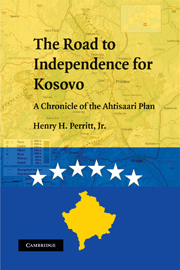Book contents
- Frontmatter
- Contents
- Acknowledgments
- Introduction
- 1 Riots in Kosovo
- 2 Albanian Resentment Comes to a Boil
- 3 Armed Conflict Grows
- 4 Cease-Fire Breaks Down
- 5 Establishing the United Nations' First Colony
- 6 Living Under a Colonial Regime
- 7 Responding to the Wake-Up Call
- 8 The Politics of Purgatory
- 9 Enter Martti Ahtisaari
- 10 The Stage for Final Status
- 11 “Practical” Negotiations
- 12 Negotiations over Status Itself
- 13 The Ahtisaari Plan
- 14 The Plan Runs into Trouble
- 15 The Troika Takes Over
- 16 Independence Day
- 17 Kosovo's Future
- 18 Implications for the International Order
- Glossary of Acronyms
- Bibliography
- Index
- References
5 - Establishing the United Nations' First Colony
Published online by Cambridge University Press: 22 January 2010
- Frontmatter
- Contents
- Acknowledgments
- Introduction
- 1 Riots in Kosovo
- 2 Albanian Resentment Comes to a Boil
- 3 Armed Conflict Grows
- 4 Cease-Fire Breaks Down
- 5 Establishing the United Nations' First Colony
- 6 Living Under a Colonial Regime
- 7 Responding to the Wake-Up Call
- 8 The Politics of Purgatory
- 9 Enter Martti Ahtisaari
- 10 The Stage for Final Status
- 11 “Practical” Negotiations
- 12 Negotiations over Status Itself
- 13 The Ahtisaari Plan
- 14 The Plan Runs into Trouble
- 15 The Troika Takes Over
- 16 Independence Day
- 17 Kosovo's Future
- 18 Implications for the International Order
- Glossary of Acronyms
- Bibliography
- Index
- References
Summary
In June 1999, Milošević decided that he had had enough. After prolonged negotiations, he agreed in the Kumanovo Accord to withdraw almost all of his forces from Kosovo, and to allow a NATO stabilization force (KFOR) and a UN-run civil administration to govern the province. The peace agreement was procured only after intense diplomatic activity, involving mediation by Finnish President Martti Ahtisaari between Russian representative (and former Prime Minister) Chernomyrdin and U.S./NATO representative Strobe Talbott, which eventually induced Russia to withdraw its support for continued Serb military activities.
The Kumanovo Accord was codified in UN Security Council Resolution 1244, which provided the constitutional basis for NATO's security presence and the UN civil administration. For its part, the KLA agreed to disarm and disband, with many of its members entitled to join a newly established Kosovo Police Service and civilian emergency force, the Kosovo Protection Corps.
The facts support different inferences about why Milošević capitulated to NATO in June 1999. One possibility is that he thought he had won. He had cleansed Kosovo of most of its Albanian population and doubted that they would return. Temporary exercise of sovereignty over Kosovo by the UN was a small price to pay for the possibility of eventual Serb reoccupation of the territory without the Albanians. With Russia's veto on the Security Council, he could hamstring the UN's exercise of authority.
- Type
- Chapter
- Information
- The Road to Independence for KosovoA Chronicle of the Ahtisaari Plan, pp. 51 - 62Publisher: Cambridge University PressPrint publication year: 2009



